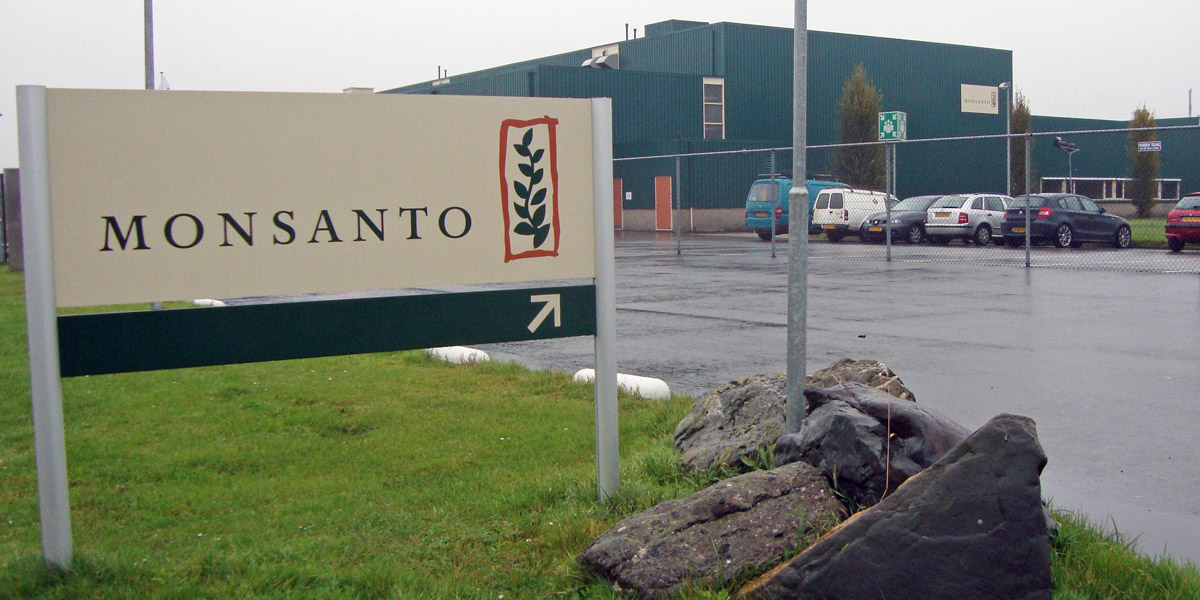
The St Louis firm is involved in a smear campaign targeting the American toxicologist Christopher Portier
It’s a last-resort manoeuvre to discredit a scientist at the heart of the controversy over glyphosate. In Brussels, according to our information, Monsanto envoys have been approaching journalists for several days to tell them an explosive story about Christopher Portier, an American toxicologist associated with the United Nations’s[1] International Agency for Research on Cancer (IARC), renowned in his field and a former head of several American research institutions.
According to the widely circulated rumour on the Internet, Prof Portier secretly received a considerable sum – $160,000 (approximately €135,000) – from law firms representing the plaintiffs in a lawsuit against Monsanto in the United States. To what purpose? To influence the IARC opinion, which classified glyphosate as a "probable carcinogen" in March 2015, and to lobby the European authorities.
These accusations were published on 13 October on an English-speaking blog and were immediately translated into French and German on other sites. They were reprinted by the daily Frankfurter Allgemeine Zeitung. This is not the first time that the author, a former lobbyist in the chemical industry, has levelled accusations against Prof Portier: in recent months he has described the scientist as a "militant", a "rat", a “demon", a "weed", a “mercenary”, and even a "little shit". He argues this time that Prof Portier has benefited from "a form of protection that is [normally] only granted to the Mafia’s accountants".
“Invited expert”
Was there corruption? "No," replied Prof Portier, when questioned by Le Monde. “I signed a retainer with a law firm, but after the IARC gave its opinion." A retainer – a contract frequently used by American lawyers – allows the services of the most credible and competent experts to be reserved at the beginning of a procedure so that they are not hired by another firm working on the same subject. Prof Portier said he collected $5,000 on signing the retainer, about two weeks after IARC gave its opinion on glyphosate.
Moreover, the role of Prof Portier was not decisive in the decision of the IARC. "Dr Portier attended the meeting as an invited specialist, i.e. an expert with knowledge and experience, but with a real or perceived conflict of interest," IARC explained. In fact, Prof Portier was then a consultant for an association, the Environmental Defense Fund.
As an invited specialist, Prof Portier "was unable to write or review any relevant document in the glyphosate classification, or to participate in the discussions that led to the assessment: he was not therefore in a position to influence the other experts during the evaluation or to modify its result.”
In addition, the classification of glyphosate as a "probable carcinogen" was adopted unanimously by the 17 experts convened by IARC between 3 and 10 March 2015.
"At the signing of this contract, I did not know what the lawyers were going to ask me to produce," he adds. “It was only in February that they asked me for a full report on glyphosate, including all the available scientific evidence. It's a lot of work, and it took most of my time for several months. The result of this work is a document of nearly 300 pages. In 2017, almost two years after consulting for IARC, Prof Portier received a total of $160,000. It’s a large amount but represents a standard rate in the United States.
Circulating on the Internet are carefully selected excerpts from the deposition of the scientist, who answered under oath, on September 5, to the lawyers of Monsanto. Reading them out of context, these excerpts suggest that his contract required him to hide his connection with the law firm.
In a statement to Politico Europe, Scott Partridge, Monsanto's vice president for global strategy, levelled serious accusations against Prof Portier, but without naming him. "To stand as a scientific expert, to attack the credibility of the European institutions and to lobby politicians and parliamentarians, while actively hiding being in the pay of law firms," he said, "all of this doesn’t just represent a deception and a complete conflict of interest, but it also destroys scientific objectivity and undermines public confidence in this important debate."
Declaration of conflict of interest
The reality is quite different. Prof Portier transmitted to Le Monde a copy of his retainer. It requires him not to disclose the nature of his work, but does not require that he disguise his contractual relationship. Having verified this, he has declared this conflict of interest on several occasions. First in the article he co-authored in August 2016 in the Journal of Epidemiology and Community Health, along with a hundred other scientists, to defend the IARC opinion. The same statement appears in a letter to the European Commission at the end of May. And finally, during his talk on 11 October at the European Parliament, he reported on his collaboration with the plaintiffs' lawyers as a prelude to his presentation.
Through Prof Portier, the peddled accusations are directed at the credibility of the IARC opinion. However, the "Monsanto papers" – the internal documents of the agrochemical firm declassified in the course of the American legal proceedings – show that even Monsanto’s own experts consider that the evaluation of glyphosate was carried out in the correct way by the international agency.
Tom Sorahan, who was dispatched by Monsanto as an observer at IARC meetings, writes in an internal memo dated March 2015: "The meeting was conducted in accordance with IARC procedures. Dr. Kurt Straif, the director of monographs, has an intimate knowledge of the rules in force and insisted that they be respected."
This is an unofficial English translation by GMWatch of “Glyphosate : Monsanto tente une dernière manœuvre pour sauver le Roundup” by Stéphane Foucart and Stéphane Horel, Le Monde, 18 October 2017.
http://www.lemonde.fr/planete/article/2017/10/18/glyphosate-monsanto-tente-une-derniere-man-uvre-pour-sauver-le-roundup_5202606_3244.html#ULxZIbgKqeXY0l1P.99
Translator’s note
1. Should be “World Health Organisation’s”










